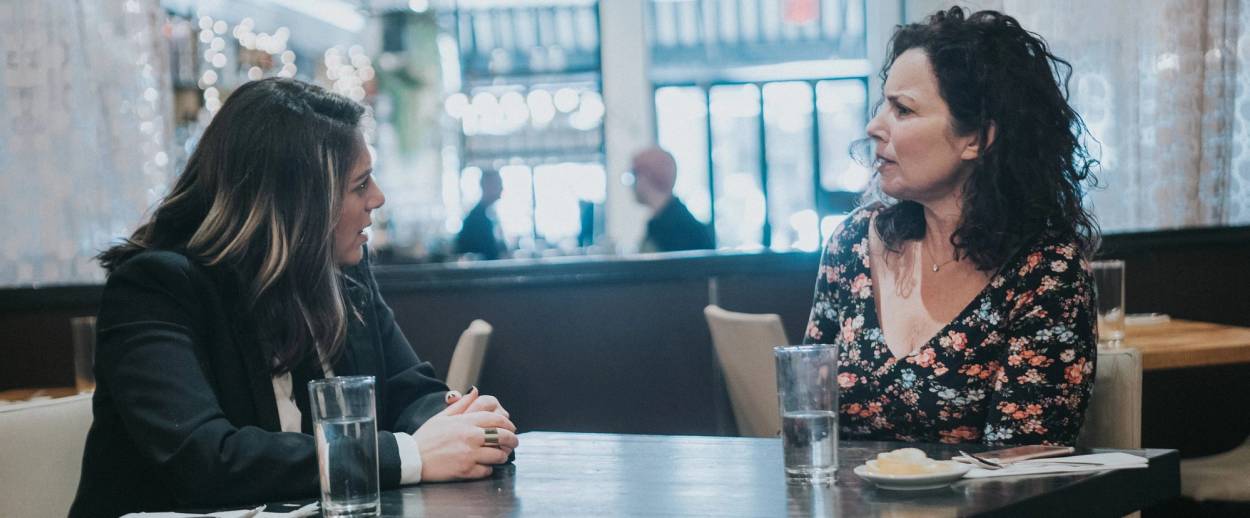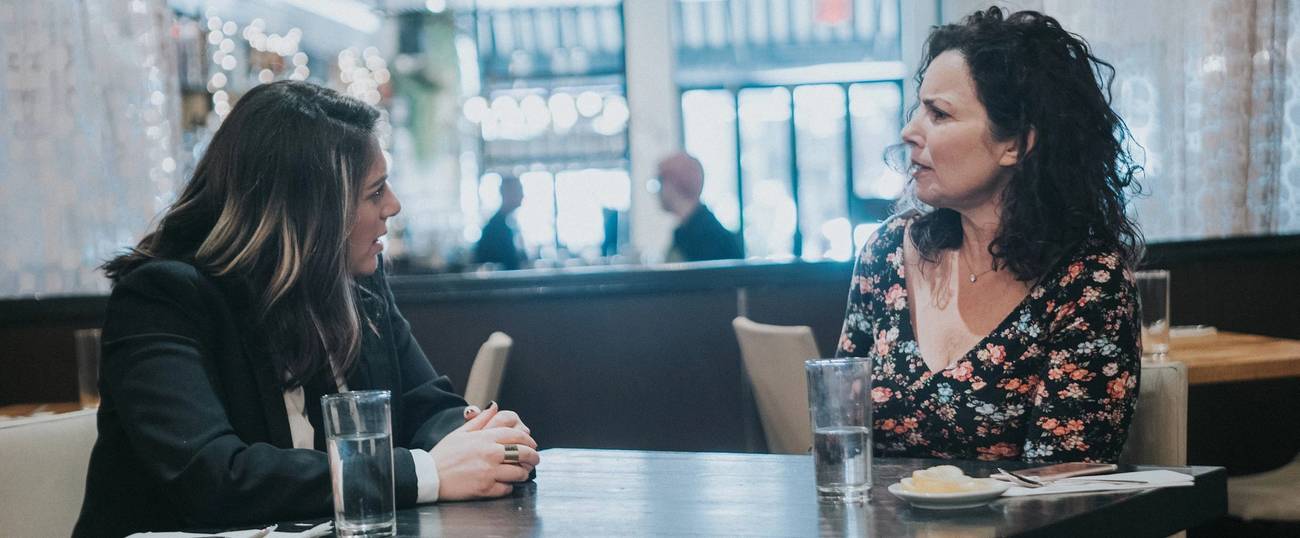‘Nanny’ Lessons
What Fran Drescher taught me




If you type the phrase “Jewish women are” into Google, it will finish your sentence with words like kvetching, haggling, nagging, guilt-inflicting. The list goes on, but I won’t.
The stereotype of Jewish women as “money-grubbing,” “social-climbing,” and “marriage-hungry” is tedious, but enduring. In reality, we’re hard working, we’re hustlers, we’re go-getters; we’re family-oriented, we’re funny, and some of us may like nice things. In short, we are complicated and layered. But variations of those Jewish women weren’t really represented in mainstream media until 1993.
That year, The Nanny debuted on CBS. No one could have known at the time that it would become one of the most successful shows of the decade. It was nominated for 12 Emmys (winning one), while its star, Fran Drescher, was nominated for one Emmy and two Golden Globes. The Nanny would go on to become internationally syndicated and translated into over 80 languages.
Drescher was 36 years old when The Nanny came out. Her character, Fran Fine, was kind of a radical type to be the heroine of a show; 30, unmarried, and childless, she was tasked with recreating herself after having been dumped by her husband and fired from her job at his bridal store. Fine was selling cosmetics door-to-door when she stumbled upon Mr. Shettfield, a wealthy widow with three children, who would become her employer and, eventually, her best friend, her lover, and finally, her husband.
In Fran Fine, America saw a character who represented hope; the show was nothing if not about second chances. This was a story about how to get your foot in the door, and what to do next.
Drescher was already famous when she played the Jewish fashion plate from Queens; she had her big break 16 years earlier when she starred opposite John Travolta in Saturday Night Fever. In real life, she came from modest roots—and gave the impression that she never really quite forgot where she came from. (Also Queens.) Drescher’s real-life mother, not coincidentally, was a bridal consultant, and her father worked for the military as a naval analyst. The beloved character she created over the six years The Nanny was on the air was, above all, relatable. She was gorgeous and fabulous, but she was also real and flawed—she was human.
The show took a thing usually looked down upon (read: climbing the socioeconomic ladder) and glamorized that thing or, at the very least, showed us that it could be ours for the taking.
If you’re willing to get your hands dirty and you have some grit and some hustle, our destinies were not predetermined and a little bit of self confidence could go a long way. Life might not always be pretty but it could be our story to write. Or at the very least, rewrite.
Fran Fine was independent, fashion-forward, perfectly coiffed, dressed to the nines, not really following any of the rules, sort of living in the lap of luxury. The Nanny was compelling because of how outrageous and outre she was, we learned from her that no one can take away your self-worth or your dignity without your permission.
In front of an audience of upward of 15 million people, she decimated the Jewish stereotype. When was the last time you heard of a Jewish American Princess aspiring to take care of other people’s children?
The Nanny represented something we’d never really seen before. There was a politics to the show that belied the glitz and glam. Fran Fine may have been “the help” but she wasn’t intimidated by her boss, or his wealth, or his social class. She did what she needed to do to take care of herself, she got her foot in the door, and she climbed up and up and up. And all along, she was always totally and completely herself.
She introduced and embraced the idea that maybe you could buck conventions. She was certainly the first representation I’d seen of a single, working woman, who rose to wild success. And so what if it was by fucking her boss? At least it was done honestly. She respected herself. She sparkled. She dared you to judge her.
*
The Nanny was a great idea for a show, but it ultimately made it to television because Drescher has chutzpah. The story is a well documented one: In the early 1980s, a friend invited Drescher to visit her in France, so she cashed in her frequent flier miles on TWA. It so happened that TWA was running a special at the time, so Drescher was able to finagle her way into first class, where she happened to wind up next to the president of CBS. “He was a captive audience for nine-and-a-half hours,” she told In Style magazine, “because where was he going to go? Coach?”
By the end of the flight, he told her that if she wanted to, when they got back to Los Angeles, she could pitch him an idea for a television show.
Once she got to France, Drescher linked up with her friend: the supermodel Twiggy. But Twiggy was working and as Drescher tells it, she wound up “schlepping” Twiggy’s 12-year-old daughter all around the city, essentially operating as her, well, nanny. This got her thinking, and she called her husband, Peter Marc Jacobs, and said, “What do you think about a spin on The Sound of Music—but instead of Julie Andrews, I come to the door?”
As they say in Hollywood, the rest is history.
I was 18 when The Nanny premiered. I lived in a working-class neighborhood in Queens, a stone’s throw from the hair salon Grandma Yetta went to on the show. I was obsessed with fashion and knew enough to know I was 100% in the wrong borough if I had any hope of “making it” in any real capacity. I was without any connections to Hollywood and could not have been further from the fame and fortune I dreamed of. But Drescher taught me that I could be outrageous and funny and smart. I could have a big mouth. I could even be Jewish and from (gasp) Queens. Drescher gave me a sense that I might actually have a shot.
Sitting down with her all these years later felt totally surreal. Much like chance, or fate, or whatever you want to call it that landed her next to the president of CBS, it wasn’t lost on me that Drescher was very much in the midst of, shall we say, a rebirth. You can barely turn your head these days without seeing her: from recent appearances on late night, a feature in The New York Times, to the cover of The Cut, to billboards in Boca. She has a new show on NBC called Indebted, and an Instagram account dedicated entirely to her outfits (What Fran Wore). Cardi B—an icon in her own right—as an adoring fan. Not too long ago, Cardi posted a picture of herself in a head-to-toe tiger print outfit and captioned it “Fran Drescher in Dolce and Gabbana” for her 59.6 million followers.
In season three, episode 21 of The Nanny, when Rene Taylor (who plays Fran’s mother) meets Elizabeth Taylor, she says, “This meeting bestows an honor upon me which is unparalleled within my universe.”
That’s how I felt when I met Drescher.
***
Like this article? Sign up for our Daily Digest to get Tablet magazine’s new content in your inbox each morning.
Periel Aschenbrand, a comedian at heart, is the author of On My Kneesand The Only Bush I Trust Is My Own.